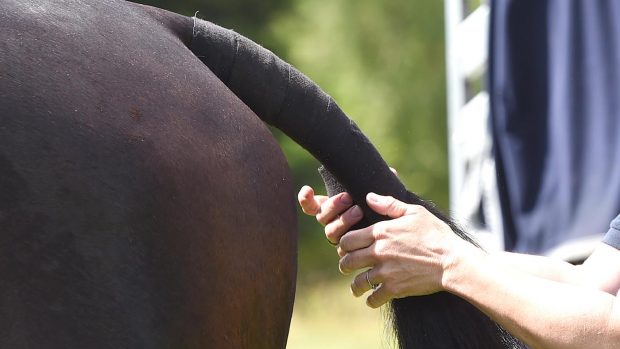A ban on bandages at events will come into force this spring in the Netherlands owing to concerns over the damage they could cause to horses’ legs during exercise.
Bandages will “no longer be permitted on the competition site” from 1 March in vaulting, and 1 April for dressage, showjumping and driving. They are already outlawed in eventing.
Bandages will still be allowed to protect legs in the stable and during transport, but will not be allowed during exercise or at prize givings.
The Dutch federation (KNHS) said that the decision is based on scientific studies.
“You can’t ignore it, so much research has been done into it. It is very clear that we should stop using it. Especially because there are alternatives if you want to protect the lower legs,” said Fenna Westerduin, who manages the horse welfare portfolio at the KNHS.
Morgan Lashley, specialist in sports medicine and equine rehabilitation at the University of Utrecht, added: “It has been investigated whether bandages can prevent overextension of the fetlock. The answer is no, even tape does not help against this.
“You can only stabilise this joint with a brace or plaster, but yes, you cannot ride with that. If you want to prevent knocking, tendon boots work better than a piece of cloth.”
She also pointed out the damage overheating can do to the elasticity of tendon issues, and the problems that can arise if bandages are not put on correctly.
“If they become loose, a horse can become entangled in them. If they are too tight or the material is not good, pressure can occur. I have even seen abroad that tendons had suffered trauma due to bandages that were too tight,” she said.
H&H vet Karen Coumbe said she agrees that a bandage is unlikely to be effective support, adding she too is “always concerned with any leg wrap or bandage that it may come loose at the wrong time”.
“I appreciate better people than me are skilled at applying them, however a modern purpose designed boot seems more sensible to me,” she said.
“Tendon injuries, especially those involving the superficial flexor, are an issue in horses doing fast work.
“It is a recognised fact that the tendons become hot as the horse works and if it is wearing bandages that heat cannot dissipate, so there is a greater potential for damage.
“Research has been done on this including use of thermography to demonstrate the heat that is generated during exercise, hence the importance of cooling limbs properly immediately after work.”
She added: “Remember if a horse has bandages on and is too hot, it cannot take them of , which in itself is not great for welfare. None of us like being too hot, but if we are, we can generally remove the extra layer.
“Good quality boots will have better air flow and the limbs hopefully will be protected but not become as hot.”
You might also be interested in:

The risks and benefits of using boots or bandages on horses’ legs
Professor Roger Smith FRCVS and Professor Michael Schramme weigh up the pros and cons

Choosing the right boots for your horse

Is ‘matchy-matchy’ in your horse’s best interest? Vet speaks out
“Think about it — does your horse really need bandages?” asks former British team vet, Campbell Thompson of Nantwich Equine

Subscribe to Horse & Hound magazine today – and enjoy unlimited website access all year round
Horse & Hound magazine, out every Thursday, is packed with all the latest news and reports, as well as interviews, specials, nostalgia, vet and training advice. Find how you can enjoy the magazine delivered to your door every week, plus options to upgrade your subscription to access our online service that brings you breaking news and reports as well as other benefits.




